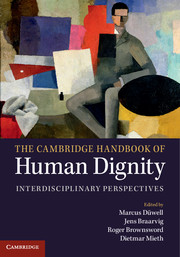Book contents
- Frontmatter
- Contents
- List of contributors
- Foreword
- Why a handbook on human dignity?
- Acknowledgments
- 1 Human dignity from a legal perspective
- 2 Human dignity: concepts, discussions, philosophical perspectives
- Part I Origins of the concept in European history
- Part II Beyond the scope of the European tradition
- Part III Systematic conceptualization
- 19 Social and cultural presuppositions for the use of the concept of human dignity
- 20 Is human dignity the ground of human rights?
- 21 Human dignity: can a historical foundation alone suffice? From Joas’ affirmative genealogy to Kierkegaard's leap of faith
- 22 Kantian perspectives on the rational basis of human dignity
- 23 Kantian dignity: a critique
- 24 Human dignity and human rights in Alan Gewirth's moral philosophy
- 25 Human dignity in the capability approach
- 26 Human dignity in Catholic thought
- 27 Jacques Maritain's personalist conception of human dignity
- 28 Scheler and human dignity
- 29 Dignity and the Other: dignity and the phenomenological tradition
- 30 Dignity, fragility, singularity in Paul Ricœur's ethics
- 31 Human dignity as universal nobility
- 32 Dignity in the ubuntu tradition
- 33 Posthuman dignity
- 34 Dignity as the right to have rights: human dignity in Hannah Arendt
- 35 Individual and collective dignity
- Part IV Legal implementation
- Part V Conflicts and violence
- Part VI Contexts of justice
- Part VII Biology and bioethics
- Appendix 1 Further reading
- Appendix 2 Universal Declaration of Human Rights
- Index
- References
26 - Human dignity in Catholic thought
from Part III - Systematic conceptualization
Published online by Cambridge University Press: 05 March 2015
- Frontmatter
- Contents
- List of contributors
- Foreword
- Why a handbook on human dignity?
- Acknowledgments
- 1 Human dignity from a legal perspective
- 2 Human dignity: concepts, discussions, philosophical perspectives
- Part I Origins of the concept in European history
- Part II Beyond the scope of the European tradition
- Part III Systematic conceptualization
- 19 Social and cultural presuppositions for the use of the concept of human dignity
- 20 Is human dignity the ground of human rights?
- 21 Human dignity: can a historical foundation alone suffice? From Joas’ affirmative genealogy to Kierkegaard's leap of faith
- 22 Kantian perspectives on the rational basis of human dignity
- 23 Kantian dignity: a critique
- 24 Human dignity and human rights in Alan Gewirth's moral philosophy
- 25 Human dignity in the capability approach
- 26 Human dignity in Catholic thought
- 27 Jacques Maritain's personalist conception of human dignity
- 28 Scheler and human dignity
- 29 Dignity and the Other: dignity and the phenomenological tradition
- 30 Dignity, fragility, singularity in Paul Ricœur's ethics
- 31 Human dignity as universal nobility
- 32 Dignity in the ubuntu tradition
- 33 Posthuman dignity
- 34 Dignity as the right to have rights: human dignity in Hannah Arendt
- 35 Individual and collective dignity
- Part IV Legal implementation
- Part V Conflicts and violence
- Part VI Contexts of justice
- Part VII Biology and bioethics
- Appendix 1 Further reading
- Appendix 2 Universal Declaration of Human Rights
- Index
- References
Summary
In the years since the Second Vatican Council (1962–5) the Roman Catholic community has emerged as a vigorous global advocate of human rights. The recent social teachings of popes and bishops, as well as the social engagement undertaken by individual Catholics and by Catholic associations, have increasingly been formulated in terms of human rights. Catholic thought and advocacy grounds its appeal to human rights in an affirmation that human dignity is the most basic standard to which all personal behaviour and social institutions are accountable. Pope John XXIII affirmed that the modern Catholic tradition of social thought is controlled ‘by one basic theme – an unshakable affirmation and defence of the dignity and rights of the human person’ (1964: 233). This commitment has led the Catholic community to become a significant force for the promotion of human dignity and human rights in Latin America, former Warsaw Pact countries such as Poland, Asian nations like the Philippines and South Korea, and increasingly in African countries. Because of these developments the late Samuel Huntington concluded that the post-Second Vatican Council Catholic church had become one of the strongest worldwide forces for human dignity, human rights and democracy (Huntington 1991).
Shifts in Catholic thought
This is a remarkable development. In the nineteenth and early twentieth centuries, Catholicism was a significant source of opposition to both human rights and democracy. For example, in 1832, Pope Gregory XVI argued against the fundamental right to freedom of conscience, declaring it to be a form of ‘insanity’ (in Latin, deliramentum) (Neuner and Dupuis 1998: No. 1002). Just over a century later, the Second Vatican Council affirmed that ‘the right to religious freedom has its foundation in the very dignity of the human person, as this dignity is known through the revealed word of God and by reason itself’ (1965a: No. 2). More broadly, the Council committed the Catholic community to support for the full array of human rights by declaring that, ‘by virtue of the gospel committed to it, the Church proclaims the rights of the human person’ (1965b: No. 41).
- Type
- Chapter
- Information
- The Cambridge Handbook of Human DignityInterdisciplinary Perspectives, pp. 250 - 259Publisher: Cambridge University PressPrint publication year: 2014
References
- 5
- Cited by



